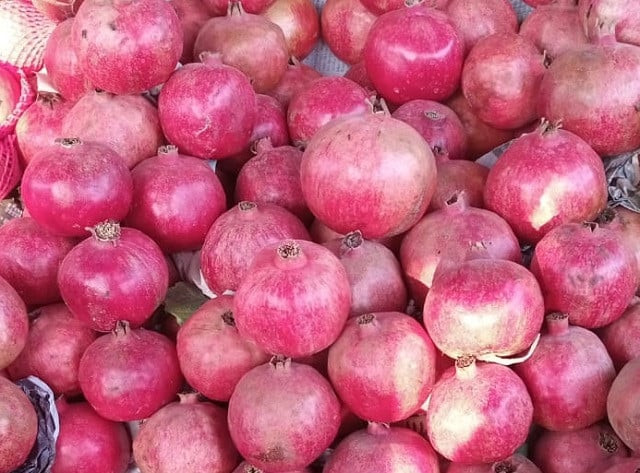Afghan traders say Kandahari pomegranates have been coming to Pakistan through the Torkham border continuously this year. PHOTO: EXPRESS/EHTESHAM KHAN
RAWALPINDI:
The prolonged, weeks-long suspension of commercial traffic at the Torkham border, fueled by rising political tensions between Pakistan and Afghanistan, has triggered severe financial turmoil for wholesalers in Rawalpindi and Islamabad.
Scores of large and medium-sized wholesalers in the twin cities have seen investments worth tens of thousands of rupees virtually wiped out. Several well-established merchants, formerly counted among the city’s most prosperous, report being reduced from millionaire status to near ruin.
Substantial advance payments had been made to Afghan suppliers for high-value shipments of fresh produce – especially grapes and Kandahari pomegranates – vegetables and, crucially, dried fruits such as raisins and dried apricots.
Containers and articulated lorries loaded with these perishable and semi-perishable goods have been stranded for weeks on the Afghan side of the Torkham crossing. With the fresh produce – pomegranates, grapes and vegetables – now deteriorating beyond repair, many trailers are reportedly being diverted back to Afghan markets.
Afghan traders have categorically refused to reimburse their Pakistani counterparts, insisting they bear no responsibility for devastation caused solely by the extended border closure. They claim the shipments were shipped in full compliance with contractual obligations, claiming they have video evidence of the loading process and proof of paid transportation costs.
Wholesale market sources in Rawalpindi and Islamabad confirm individual losses ranging from Rs40 million to Rs100m, with a major trading consortium facing an estimated loss of Rs150m.
While Afghan exporters have signaled their willingness to renegotiate the price of dried fruit shipments – with a 15-20 percent reduction – they have categorically rejected any concessions related to fresh produce, particularly grapes, Kandahari pomegranates and vegetables.
Ghulam Qadir Mir, president of Anjuman Tajran Sabzi Mandi (Vegetable Market Traders Association), attributes the skyrocketing price of grapes and pomegranates in the twin cities, now selling at Rs600 to Rs700 per kilogram, directly to the interrupted supply line from Afghanistan. The shortage has also pushed up the prices of domestic grapes.
Given the gravity of the crisis, traders are urging the government of Pakistan to initiate immediate, formal cooperation with the Afghan authorities.
Their most pressing demand is that the stranded containers and trailers – already paid for and awaiting entry – be given a one-time, extraordinary clearance to Pakistan, even if all future orders are suspended.
Grape, pomegranate and dried fruit wholesalers Haji Shafqat and Muhammad Meharban Khan explained that reservations for Afghan produce are typically placed ahead of the season. Orders worth between Rs40m and Rs150m were placed in late August and September to ensure timely transportation. However, political tensions and the subsequent border closure have resulted in catastrophic economic losses.
They note that while border closures have occurred in the past, shipments were usually released within a week to 10 days. Expecting a similar result this time, they continued with their seasonal orders – only to see their goods decay with the onset of winter.
Conversely, trucks carrying Pakistani goods to Afghanistan have also been stranded on the Pakistani side, causing mutual economic damage to traders across the border.
In a bid to survive, the worst-hit wholesalers in Rawalpindi and Islamabad have been forced to take out new, substantial loans to resume the modest local fruit and vegetable trade.



